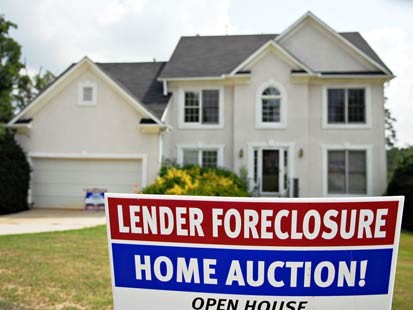Photo courtesy of A Different Kind of Blog
There is nothing about shiny new gadgets and gear in this post; sorry about that. But your friendly Gear Diary folks think that you, our readers, should be warned about stuff every once in a while. Why? Well, if you’re well-off enough to buy some of the gadgets, gizmos, and gear that we talk about here, you’re probably going to be (or already are) a homeowner. And if you’re a homeowner, well, you need to know about the upcoming rule changes that will make your life much more difficult.
See, back in 2008, the financial markets cratered because the bank people were doing stuff with money that was illegal, immoral, ill-advised, that they didn’t understand, or some combination of all those factors. The federal government, in its wisdom, bailed them out to the tune of nearly a trillion dollars. The government did not put any strings on the money; it was a desperation move designed to keep the banks both here and around the world from totally collapsing. And in that, it worked.
Photo courtesy of Aftermath News
Part of what was needed in addition, both then and now, was for the bailed-out banks to loosen their lending rules a bit and make some money (big shot economists call it “capital”) available to small businesses and people buying things like homes. And in that, it’s been a flat-out failure. Banks instead have tightened their lending rules, holding on to their money and trying to run up profits with a lot of the same tricks they used before that collapsed the system. Not unlike a roulette player in Vegas losing all his money, getting a casino loan, and then gambling with that (although in this case, We The People are playing the part of the casino, except we’re not getting the standard percentage rake-off on the bets).
You may know people who have paid off their credit card balances, only to have those cards cancelled. Or maybe you know one of the 20% of Americans whose homes are in foreclosure, and who can’t get loan modifications because the banks don’t want to make the money (some of which is our money) available. Or maybe you’ve gotten a new credit-card offer, filled it out so you can transfer your balance from some high-interest card, and gotten a terse letter in response denying you the card that the bank offered, but offering you a card with a ridiculously high rate and ludicrously low credit limit.
God knows I know people like that.
Photo courtesy of Mike Payne
In such a world, we at GD think it’s pretty critical to keep yourself informed. And in that vein, we wanted to warn you about some upcoming Federal Housing Administration (FHA) rule changes that are going to make it even harder for you to buy a house. Yes, it’s apparently not bad enough for banks to be putting the squeeze on you; now it’s time for the government to do so as well.
Read it and, no, don’t weep: call your congressperson. Call your Senators. Call the FHA. Send emails, send snail mail, sign petitions that people shove at you. Educate yourself on the rule changes and complain, not to us or your friends or on other blogs, but to our elected officials. Loudly. I know sometimes it seems like their only goal in life is to make money, ask for campaign contributions, and get re-elected, but if enough people squawk loud enough, things can change. And as cynical as I am, I really believe that.
The full press release reads:
Ann Arbor, MI, August 3, 2010 – “The Federal Housing Administration (FHA) is planning two major changes that will impact homebuyers and the housing market,” said Gibran Nicholas, Chairman of the CMPS Institute, an organization that trains and certifies mortgage bankers and brokers. “These changes will reverberate throughout the entire housing market because the FHA insures approximately 30% of all home loans in the US today.”
#1 – Buyer’s Down Payment Effectively Doubled
“The required buyer contribution when buying a home will be nearly doubled to 6.5% from the current 3.5%,” Nicholas said. “When a homebuyer uses an FHA-insured mortgage to purchase a home, the seller is currently allowed to contribute up to 6% of the sales price toward the buyer’s closing costs. This is due to the fact that FHA loans carry much higher closing costs than conventional mortgages. For example, the FHA charges an additional 2.25% in upfront mortgage insurance that isn’t associated with traditional loans. Under the proposed changes, sellers would only be allowed to contribute 3% of the sales price toward the buyer’s closing costs. This means that homebuyers will not only need to come up with the traditional 3.5% down payment, but they will also need an additional 3% for closing costs that have traditionally been paid by sellers.”
#2 – Higher Credit Score Requirements
The FHA has traditionally not imposed minimum credit score requirements on mortgage borrowers, leaving it up to lenders to evaluate the borrower’s credit. However, the FHA is now proposing to enforce a 500 minimum credit score across the board. Furthermore, any score between 500 and 579 will require a 10% minimum down payment instead of the current 3.5% minimum down payment.
The Department of Housing and Urban Development (HUD), which sets the guidelines for FHA loans, is giving interested persons until August 16 to comment on the proposed changes. “After that time, HUD will take all the comments into consideration and publish final rules that will likely be effective later this year or sometime in 2011,” Nicholas said. “We told HUD that we completely disagree with their proposal to effectively double the buyer’s down payment requirements by reducing seller-paid closing costs. This will hurt the housing market by making it more difficult for qualified buyers with high credit scores to buy a home. On the other hand, we applaud HUD’s second proposal for higher credit score requirements because this may actually be better for the housing market in the long run. It preserves the FHA insurance fund and greatly reduces future foreclosures associated with riskier lending. In any case, homebuyers considering an FHA loan should get moving today in order to avoid getting blindsided by these new rules.”
About CMPS Institute: The CMPS Institute administers the Certified Mortgage Planning Specialist (CMPS®) designation through an extensive curriculum that focuses on mortgage suitability and borrower education, a comprehensive examination process, an enforceable code of ethics, and annual continuing education requirements. Recognized for its preeminence within the industry, the CMPS curriculum goes above and beyond the minimal licensing requirements, and represents the core knowledge expected of residential mortgage professionals. Over 5,500 mortgage professionals have gone through the program since its establishment in 2005. CMPS Institute is an NMLS-approved course provider under the SAFE Act (NMLS Provider ID # 1400384). For more information or to find a certified professional near you, please visit the CMPS Institute or call 888.608.9800.




Some of the banks’ ill advise came the from the very government that latter bailed them out with our National Credit Card (debt). Even with the doubling of the down payment and new guidelines it is ridiculous what banks are still willing to lend. In our nice little house we laugh at what the government would call a responsible loan. It scares me that that they will even consider down to 500 on the credit score. Having worked in lending, I understand good people can have low beacons scores, but did we learn nothing over the past 4 years?
Stll easier than any other country in the world, where the minimum down payment is 10%, most interest rates are in excess of 6% and housing prices are astronomical.
RT @GearDiarySite: FHA Deals Housing Market a Blow http://goo.gl/fb/fBo7Q